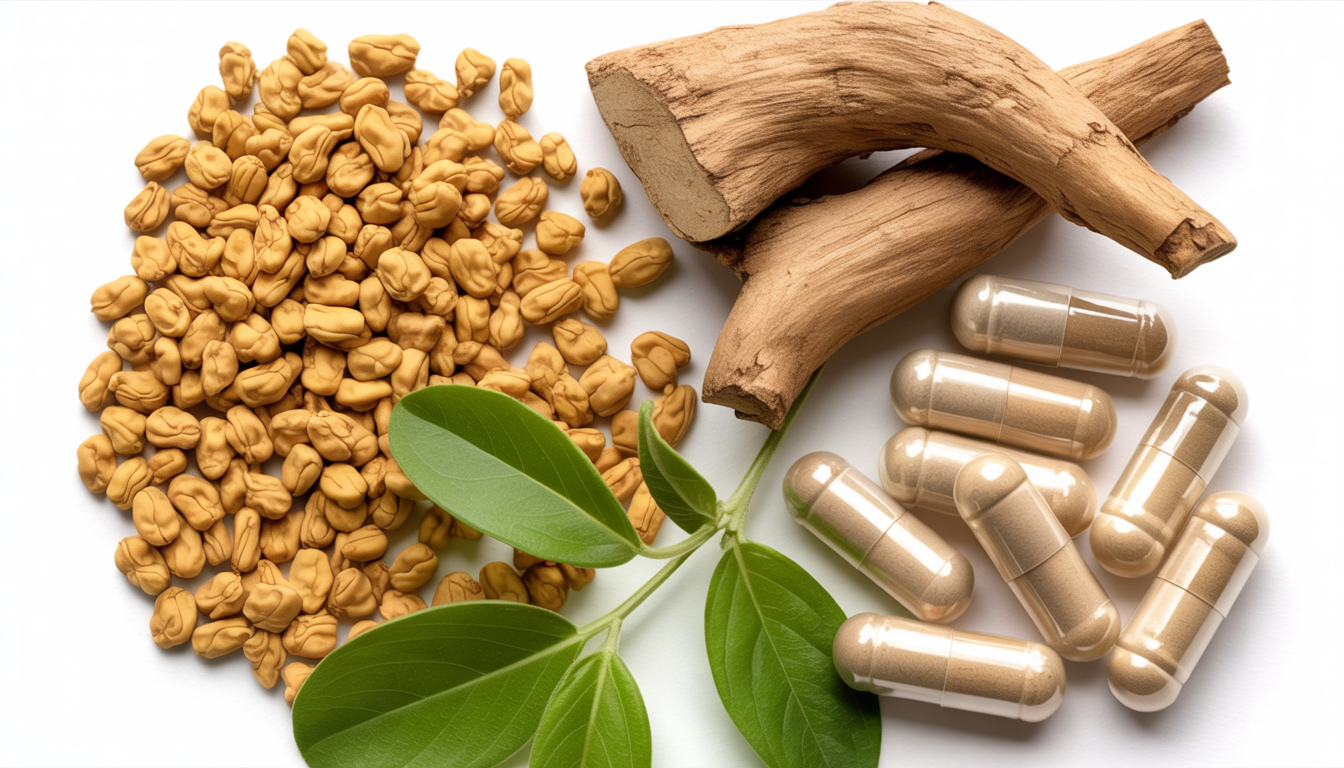


Boost Muscle Strength with Leucine for Post Workout Recovery
By Steve Blechman
An amazing new study recently appeared in the January 21, 2020 Journal of Nutrition that found that feeding cerebral palsy (CP) adolescents and adults pure leucine and essential amino acids for 10 weeks boosted muscle strength and overall muscle health! After 10 weeks of pure leucine feeding dissolved in water, there was a 25.4% increase in muscle strength and a 3.6% increase in muscle volume in the leucine group, with no changes in the control group.
This was accompanied by a 59.1% reduction in C-Reactive protein (a measurement of systemic inflammation) and improved perceptions of well-being in the leucine group. The conclusion of this study was, "Improvements in muscle strength and volume with leucine supplementation might provide important functional changes for adults with CP and could be partly explained by reduced inflammation. The improved well-being highlights its capacity to improve the quality of daily living." The improvement of muscle strength and volume of skeletal muscle with supplemental leucine of cerebral palsy adolescents and adults can provide improvement in strength and power to grasp, reach, balance, lift, and walk, and lower inflammation, provide better metabolic health, blood sugar control, prevention of cardiovascular disease, and premature death. These findings underscore the leucine benefits in enhancing muscle recovery and overall health.
Cerebral palsy is a debilitating congenital neurological disorder that is due to abnormal brain development or injury, often before birth that affects body movements, muscle tone, muscle coordination, balance, strength and posture. It is rare and affects 200,000 cases in the United States per year.Symptoms include rigid limbs and involuntary motions. Treatment includes occupational and special physical therapy, exercise, drugs and sometimes surgery. A person with cerebral palsy might need special equipment to walk, or might not be able to walk at all, and might need lifelong care. Currently, there is no cure for cerebral palsy and hopefully with ongoing research a cure will be found.
Over the last couple of years, I have been a big proponent of the essential amino acid leucine for activating the anabolic trigger of protein synthesis in muscle over branched-chain amino acid mixtures containing leucine, isoleucine, and valine (BCAAs). Branched-chain amino acid mixtures (BCAAs) refer to three amino acids: leucine, valine, and isoleucine. Over the years, the popularity of BCAA mixtures has grown with the false understanding that BCAAs alone are most effective for increasing the anabolic drive in muscle protein synthesis. The research has shown that taking pure leucine is more effective than the combination of BCAAs (leucine, isoleucine and valine). Research has also shown that leucine alone (not isoleucine and valine) is anabolic, and enhances protein synthesis (Journal of Physiology, 2013). Research has demonstrated that isoleucine and valine limit the effectiveness of leucine when taken together! Isoleucine and valine compete for absorption into the blood and into muscle cells. All three BCAAs share the active transport system. Research in humans has shown that taking BCAAs (leucine, isoleucine, valine) together can decrease muscle protein synthesis. That's why I recommend leucine by itself over BCAA mixtures because combining BCAAs might limit the stimulation of protein synthesis because of reduced uptake of leucine in the blood and in muscle cells. Leucine (5 grams) should be taken preferably post workout 30-60 minutes before a post workout meal to activate the anabolic trigger of protein synthesis. Research has shown that pure leucine is more anabolic than the same amount of leucine in food. A Japanese study published on October 18, 2018 in the journal Nutrients found that taking leucine supplements alone may be better for muscle protein synthesis and more anabolic than leucine from food! Japanese researchers found that blood levels of leucine were higher from pure, free leucine taken alone compared to the same amount of leucine in a meal. Increase in muscle protein synthesis is dependent on leucine concentration. Research has shown that leucine stimulates the anabolic effect of muscle protein on its own (Wilkinson et al., J Physiol 2013). The Nutrients study stated that, "based on these findings, it is presumed that compared to the intake of protein alone or free amino acids alone, the intake of dietary protein from mixed meals may result in a lower maximum plasma leucine concentration." However, no study to date has investigated the changes in amino acid concentrations after the ingestion of mixed meals in comparison to those after the intake of a similar amount of free amino acids (Nutrients, October 2018). The post workout meal will provide all the essential amino acids for optimal muscle protein synthesis.
Benefits of Leucine:
-Leucine is the key anabolic trigger to protein synthesis.
-Increases in muscle protein synthesis are dependent on leucine concentration.
-5 grams of leucine can increase the anabolic effects of protein synthesis when eating less protein, which is ideal on a ketogenic diet.
-Research has shown 6.25 grams of whey protein with 5 grams of leucine is equivalent to at least 25 grams of whey protein.
-Anabolic resistance in people over 40 can be overcome by consuming greater quantities of leucine.
-Leucine and not total protein content of a supplement is the primary determinant of muscle protein anabolic responses in healthy older people.
-Research has shown that pure leucine is more anabolic than protein in food!
-Leucine is the key amino acid for enhancing mTOR pathway that regulates cell growth and protein synthesis.
-Leucine has many benefits: powering muscle growth, preventing muscle loss, and enhancing muscle recovery.
ADVANCED MOLECULAR LABS (AML)™ POST WORKOUT CONTAINS: 5 grams of pure leucine plus 5 grams of creatine monohydrate and 2.5 grams of betaine. Leucine is a potent mTOR activator and creatine functions as a myostatin inhibitor. Betaine stimulates growth hormone (GH) and insulin-like growth factor-1 (IGF-1) secretion. Combining leucine with creatine monohydrate and betaine supports muscle growth from multiple pathways, helping you recover faster and grow more lean muscle. This makes it an ideal supplement for those engaging in strength training exercises.
For best results as recovery after exercise, take ADVANCED MOLECULAR LABS (AML)™ POST WORKOUT which contains 5 grams of leucine (on an empty stomach) 15-30 minutes before a post-workout meal. By taking pure leucine on an empty stomach, you will get a better spike in blood levels than if you take leucine with food, because food can slow leucine's absorption. When leucine is taken on an empty stomach, it's a powerful metabolic switch that turns on protein synthesis. Leucine increases mTOR activity for several hours after training. When leucine is taken after resistance exercise, and before a post-workout protein-containing meal rich in essential amino acids, that's also found in ADVANCED MOLECULAR LABS (AML)™ POST WORKOUT®, it will trigger greater protein synthesis for improved recovery and greater gains!
References:
- Nicola Theis, Meghan A Brown, Paula Wood, Mark Waldron, Leucine Supplementation Increases Muscle Strength and Volume, Reduces Inflammation, and Affects Wellbeing in Adults and Adolescents with Cerebral Palsy, The Journal of Nutrition, nxaa006. https://doi.org/10.1093/jn/nxaa006
- Santos CS, Nascimento FEL. Isolated branched-chain amino acid intake and muscle protein synthesis in humans: a biochemical review. Einstein (Sao Paulo). 2019;17(3):eRB4898. Published 2019 Sep 5. doi:10.31744/einstein_journal/2019RB4898
- Wilkinson DJ, Hossain T, Hill DS, et al. Effects of leucine and its metabolite beta-hydroxy-beta-methylbutyrate on human skeletal muscle protein metabolism. J Physiol. June 1, 2013;591(11):2911-2923. doi:10.1113/jphysiol.2013.253203
- Stephen J. Crozier, Scot R. Kimball, Sans W. Emmert, Joshua C. Anthony, Leonard S. Jefferson. Oral Leucine Administration Stimulates Protein Synthesis in Rat Skeletal Muscle. The Journal of Nutrition, Volume 135, Issue 3, March 2005, Pages 376-382, https://doi.org/10.1093/jn/135.3.376
- Hyde R, Taylor PM, Hundal HS. Amino acid transporters: roles in amino acid sensing and signalling in animal cells. Biochem J. 2003;373(Pt 1):1-18. Review.
- Churchward-Venne TA, Burd NA, Phillips SM. Nutritional regulation of muscle protein synthesis with resistance exercise: strategies to enhance anabolism. Nutr Metab (Lond). 2012;9(1):40.
- Churchward-Venne TA, Burd NA, Mitchell CJ, West DW, Philp A, Marcotte GR, et al. Supplementation of a suboptimal protein dose with leucine or essential amino acids: effects on myofibrillar protein synthesis at rest and following resistance exercise in men. J Physiol. 2012;590(11):2751-65.
- Churchward-Venne TA, Breen L, Di Donato DM, Hector AJ, Mitchell CJ, Moore DR, et al. Leucine supplementation of a low-protein mixed macronutrient beverage enhances myofibrillar protein synthesis in young men: a double-blind, randomized trial. Am J Clin Nutr. 2014;99(2):276-86.
- Bukhari SS, Phillips BE, Wilkinson DJ, Limb MC, Rankin D, Mitchell WK, et al. Intake of low-dose leucine-rich essential amino acids stimulates muscle anabolism equivalently to bolus whey protein in older women at rest and after exercise. Am J Physiol Endocrinol Metab. 2015;308(12):E1056-65.
- Audrey Chanet, Sjors Verlaan, Jérôme Salles, Christophe Giraudet, Véronique Patrac, Véronique Pidou, Corinne Pouyet, Nordine Hafnaoui, Adeline Blot, Noël Cano, Nicolas Farigon, Anke Bongers, Marion Jourdan, Yvette Luiking, Stéphane Walrand, Yves Boirie. Supplementing Breakfast with a Vitamin D and Leucine-Enriched Whey Protein Medical Nutrition Drink Enhances Postprandial Muscle Protein Synthesis and Muscle Mass in Healthy Older Men, The Journal of Nutrition, Volume 147, Issue 12, December 2017, Pages 2262-2271, https://doi.org/10.3945/jn.117.252510
- Liberman K, Njemini R, Luiking Y et al. Thirteen weeks of supplementation of vitamin D and leucine-enriched whey protein nutritional supplement attenuates chronic low-grade inflammation in sarcopenic older adults: the PROVIDE study. Aging Clin Exp Res, June 2019;31(6):845-854. doi:10.1007/s40520-019-01208-4
- Westmead Institute for Medical Research. Muscling in on the role of vitamin D: Research shows vitamin D signaling is needed for normal muscle size and strength. ScienceDaily, 26 June 2019. www.sciencedaily.com/releases/2019/06/190626125107.htm
- Amely M Verreijen, Sjors Verlaan, Mariëlle F Engberink, Sophie Swinkels, Johan de Vogel-van den Bosch, Peter JM Weijs. A high whey protein-, leucine-, and vitamin D-enriched supplement preserves muscle mass during intentional weight loss in obese older adults: a double-blind randomized controlled trial. The American Journal of Clinical Nutrition, Volume 101, Issue 2, February 2015, Pages 279-286, https://doi.org/10.3945/ajcn.114.090290
- Zheng R, Huang S, Zhu J et al. Leucine attenuates muscle atrophy and autophagosome formation by activating PI3K/AKT/mTOR signaling pathway in rotator cuff tears. Cell Tissue Res 2019. https://doi.org/10.1007/s00441-019-03021-x
- Devries MC, Philips SM, Baker SK et al. Leucine, Not Total Protein, Content of a Supplement Is the Primary Determinant of Muscle Protein Anabolic Responses in Healthy Older Women. The Journal of Nutrition, July 1, 2018.
- Bauer, Jürgen M. et al. Effects of a Vitamin D and Leucine-Enriched Whey Protein Nutritional Supplement on Measures of Sarcopenia in Older Adults, the PROVIDE Study: A Randomized, Double-Blind, Placebo-Controlled Trial. Journal of the American Medical Directors Association, Volume 16, Issue 9, 740-747. September 201
- Sakiko Abe, Osamu Ezaki, Motohisa Suzuki. Medium-Chain Triglycerides in Combination with Leucine and Vitamin D Increase Muscle Strength and Function in Frail Elderly Adults in a Randomized Controlled Trial. The Journal of Nutrition, Volume 146, Issue 5, May 2016, Pages 1017-1026, https://doi.org/10.3945/jn.115.228965
- Salehpour A, Hosseinpanah F, Shidfar F, et al. A 12-week double-blind randomized clinical trial of vitamin D₃ supplementation on body fat mass in healthy overweight and obese women. Nutr J 2012;11:78. Published 2012 Sep 22. doi:10.1186/1475-2891-11-78
- Chang, Eugene and Kim, Yangha. Vitamin D decreases adipocyte lipid storage and increases NAD-SIRT1 pathway in 3T3-L1 adipocytes. Nutrition 2016, Vol: 32, Issue: 6, Page: 702-8 10.1016/j.nut.2015.12.032
- Yoshihiro Yoshimura, Takahiro Bise, Fumihiko Takatsuk et al. Effects of a leucine-enriched amino acid supplement on muscle mass,muscle strength, and physical function in post-stroke patients with sarcopenia: A randomized controlled trial. February 2019, Nutrition. https://www.sciencedirect.com/science/article/pii/S089990071830594X?via%3Dihub
- N Yoshii at al. Effect of Mixed Meal and Leucine Intake on Plasma Amino Acid Concentrations in Young Men. Nutrients, October 2018, 10(10), 1543; https://doi.org/10.3390/nu10101543
- Thomas I Gee, Thomas J Woolrich, Mark F Smith. Effectiveness of Whey Protein Hydrolysate and Milk-Based Formulated Drinks on Recovery of Strength and Power Following Acute Resistance Exercise. (August 2019) Journal of Human Kinetics, volume 68/2019, 193-200 DOI: 10.2478/hukin-2019-0066 19
- Tim Newmann. Post-workout protein shakes: Do they reduce muscle pain, aid recovery? Sunday 1 September 2019 Medical News Today https://www.medicalnewstoday.com/articles/326207.php
- Gonzalez, Adam M; Hoffman, Jay R; Jajtner, Adam R; Townsend, Jeremy R; Boone et al. Protein supplementation does not alter intramuscular anabolic signaling or endocrine response after resistance exercise in trained men (September 2015) Vol: 35, Issue: 11, Page: 990-1000. DOI 10.1016/j.nutres.2015.09.006
- Wilkinson DJ et al. Effects of leucine and its metabolite beta-hydroxy-beta-methylbutyrate on human skeletal muscle protein metabolism. J Physiol 2013,591,2911-2923.
- Rahimi MH, Shab-Bidar S et al. Branched-chain amino acid supplementation and exercise-induced muscle damage in exercise recovery: A meta-analysis of randomized clinical trials. Nutrition, October 2017.
- Szmelcman S, Guggenheim K. Interference between leucine, isoleucine and valine during intestinal absorption. Biochemical Journal 1966;100(1):7-11.
- Parvin Mirmiran, PHD, Farshad Teymoori, PHD, Golaleh Asghari, PHD, Fereidoun Azizi, MD. Dietary Intakes of Branched Chain Amino Acids and the Incidence of Hypertension: A Population-Based Prospective Cohort Study. Arch Iran Med, April 2019;22(4):182-188.
- Tessier AJ, Chevalier S. An Update on Protein, Leucine, Omega-3 Fatty Acids, and Vitamin D in the Prevention and Treatment of Sarcopenia and Functional Decline. Nutrients, 2018;10(8):1099. Published 2018 Aug 16. doi:10.3390/nu10081099.
- Wolfe R. Branched-chain amino acids and muscle protein synthesis in humans: myth or reality? Journal of the International Society of Sports Nutrition, volume 14, Article number: 30 (August 22, 2017)
- Devries M, McGlory C, Bolster D et al. Leucine, Not Total Protein, Content of a Supplement Is the Primary Determinant of Muscle Protein Anabolic Responses in Healthy Older Women, The Journal of Nutrition, Volume 148, Issue 7, July 2018, Pages 1088-1095, https://doi.org/10.1093/jn/nxy091
- Arentson-Lantz E, Galvan F, Deer R, Wacher A, Paddon-Jones D. Leucine Supplementation Partially Protects Leg Lean Mass in Older Adults During Seven Days of Bed Rest (OR18-02-19). Curr Dev Nutr 2019;3(Suppl 1):nzz028.OR18-02-19. Published 2019 Jun 13. doi:10.1093/cdn/nzz028.OR18-02-1
- Zheng R, Huang S, Zhu J et al. Leucine attenuates muscle atrophy and autophagosome formation by activating PI3K/AKT/mTOR signaling pathway in rotator cuff tears. Cell Tissue Res 2019. https://doi.org/10.1007/s00441-019-03021-x





